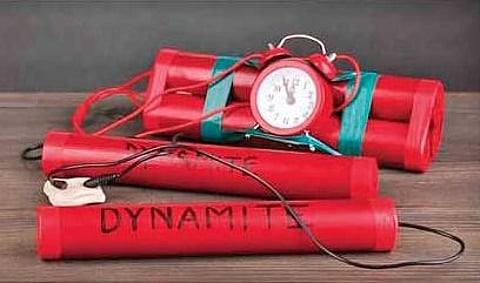

KOCHI: Bomb squad officers are trained to place public safety above their own lives. Though largely away from the media glare, these officers have to be ready 24/7 for heroic, impetuous acts of valour.
“Bomb threats are situations that describe the stuff we are made of; whether we are cowards or brave men,” says Additional Sub-Inspector Jose M.V, who is attached to the bomb squad in Kochi. “We are a small team of select police personnel and dogs trained to detect, handle and dispose of improvised explosive devices (IEDS). We are also assigned VVIP duties and anti-sabotage checks.”
Amid the high-tension work, there are cases of hoax threats and waggish situations, too, says Jose. One memorable case was at the Kochi international airport, which sees three to four hoax threats every year, he adds.“It was 2006. A passenger, who identified himself as a doctor from Uganda, got into a tiff with officials during security screening. Some airline personnel heard him talk about a ‘bomb’. Alarm bells were set off,” Jose recalls.
“The pilot was alerted and the flight was halted. The passenger’s bag was checked. The bomb squad searched every cavity in his body! Eventually, it turned out that the doctor of south Indian origin was miffed that security officials had removed pickle containers from his baggage. He snapped, saying ‘You guys saw the pickles, but not the bomb.’”
Jose recalls a similar case in the city limits. “It was in 2008. We received a call from a top hospital in Kochi informing us that it had received a bomb threat,” he says. “Someone called the hospital’s reception and warned that a bomb would go off at any time. Our flying squad party rushed to the spot, and sealed the building. When there is such a threat, an MED (Men + Equipment + Dogs) search is conducted. Explosive devices are usually placed in areas where there is public movement. So the search party scanned the priority areas such as lobbies and wards. Another team headed to the casualty and ICU. Despite an extensive search, we were unable to locate any explosive material.”
Soon, Jose adds, the bomb squad team got a call from the local police station. “They asked us to call off the operation,” he says. “Officers traced the call to a house in Cheranalloor, about 4km from the hospital. On reaching there, we found a woman in her 70s and her grandson playing inside a room. It was a working day, so we asked the kid why he had not gone to school. He hid behind his grandmother.”
And then unspooled the real ‘bomb story’. “Earlier in the day, the boy’s parents had visited his aunt, who had delivered a baby that morning, at the hospital,” says Jose. “The little one was upset that they had not taken him along to see the newborn. So he dialled the hospital and said there was a bomb there. He got the number from a hospital card at home. Considering the child’s age, we kept the case away from the media glare and did not press any charges.”
Case diary
This weekly column brings you exciting, intriguing police stories, straight from the crime files